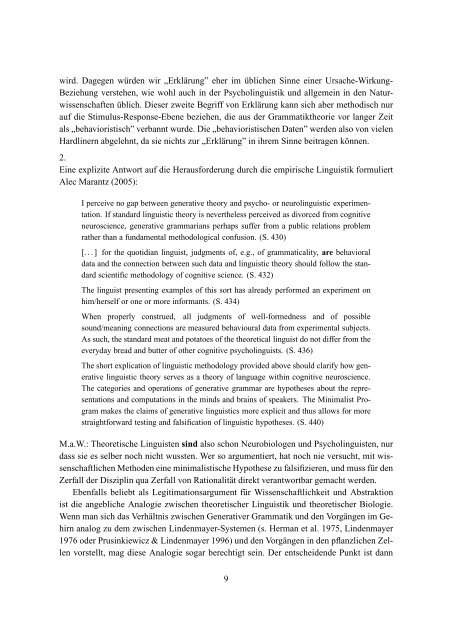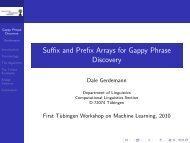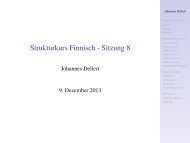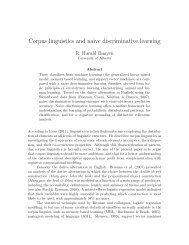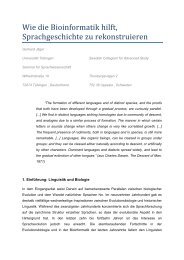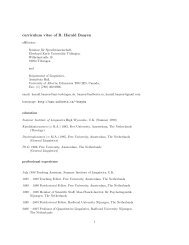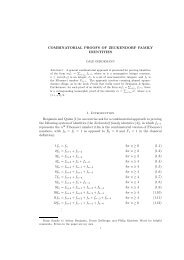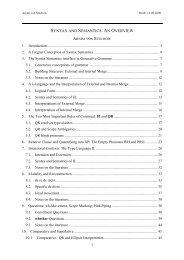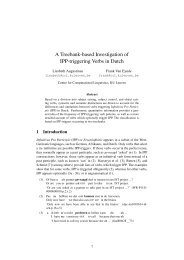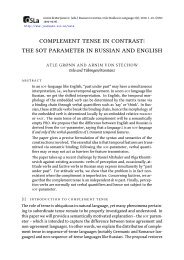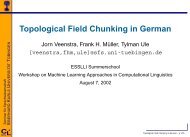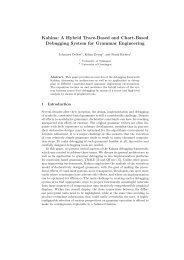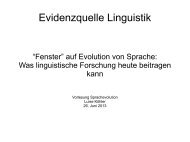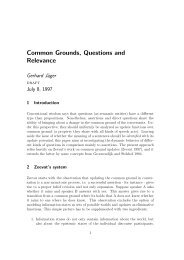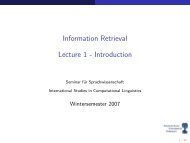Wo stehen wir in der Grammatiktheorie? - Seminar für ...
Wo stehen wir in der Grammatiktheorie? - Seminar für ...
Wo stehen wir in der Grammatiktheorie? - Seminar für ...
Sie wollen auch ein ePaper? Erhöhen Sie die Reichweite Ihrer Titel.
YUMPU macht aus Druck-PDFs automatisch weboptimierte ePaper, die Google liebt.
<strong>wir</strong>d. Dagegen würden <strong>wir</strong> „Erklärung” eher im üblichen S<strong>in</strong>ne e<strong>in</strong>er Ursache-Wirkung-<br />
Beziehung ver<strong>stehen</strong>, wie wohl auch <strong>in</strong> <strong>der</strong> Psychol<strong>in</strong>guistik und allgeme<strong>in</strong> <strong>in</strong> den Naturwissenschaften<br />
üblich. Dieser zweite Begriff von Erklärung kann sich aber methodisch nur<br />
auf die Stimulus-Response-Ebene beziehen, die aus <strong>der</strong> <strong>Grammatiktheorie</strong> vor langer Zeit<br />
als „behavioristisch” verbannt wurde. Die „behavioristischen Daten” werden also von vielen<br />
Hardl<strong>in</strong>ern abgelehnt, da sie nichts zur „Erklärung” <strong>in</strong> ihrem S<strong>in</strong>ne beitragen können.<br />
2.<br />
E<strong>in</strong>e explizite Antwort auf die Herausfor<strong>der</strong>ung durch die empirische L<strong>in</strong>guistik formuliert<br />
Alec Marantz (2005):<br />
I perceive no gap between generative theory and psycho- or neurol<strong>in</strong>guistic experimentation.<br />
If standard l<strong>in</strong>guistic theory is nevertheless perceived as divorced from cognitive<br />
neuroscience, generative grammarians perhaps suffer from a public relations problem<br />
rather than a fundamental methodological confusion. (S. 430)<br />
[. . . ] for the quotidian l<strong>in</strong>guist, judgments of, e.g., of grammaticality, are behavioral<br />
data and the connection between such data and l<strong>in</strong>guistic theory should follow the standard<br />
scientific methodology of cognitive science. (S. 432)<br />
The l<strong>in</strong>guist present<strong>in</strong>g examples of this sort has already performed an experiment on<br />
him/herself or one or more <strong>in</strong>formants. (S. 434)<br />
When properly construed, all judgments of well-formedness and of possible<br />
sound/mean<strong>in</strong>g connections are measured behavioural data from experimental subjects.<br />
As such, the standard meat and potatoes of the theoretical l<strong>in</strong>guist do not differ from the<br />
everyday bread and butter of other cognitive psychol<strong>in</strong>guists. (S. 436)<br />
The short explication of l<strong>in</strong>guistic methodology provided above should clarify how generative<br />
l<strong>in</strong>guistic theory serves as a theory of language with<strong>in</strong> cognitive neuroscience.<br />
The categories and operations of generative grammar are hypotheses about the representations<br />
and computations <strong>in</strong> the m<strong>in</strong>ds and bra<strong>in</strong>s of speakers. The M<strong>in</strong>imalist Program<br />
makes the claims of generative l<strong>in</strong>guistics more explicit and thus allows for more<br />
straightforward test<strong>in</strong>g and falsification of l<strong>in</strong>guistic hypotheses. (S. 440)<br />
M.a.W.: Theoretische L<strong>in</strong>guisten s<strong>in</strong>d also schon Neurobiologen und Psychol<strong>in</strong>guisten, nur<br />
dass sie es selber noch nicht wussten. Wer so argumentiert, hat noch nie versucht, mit wissenschaftlichen<br />
Methoden e<strong>in</strong>e m<strong>in</strong>imalistische Hypothese zu falsifizieren, und muss <strong>für</strong> den<br />
Zerfall <strong>der</strong> Diszipl<strong>in</strong> qua Zerfall von Rationalität direkt verantwortbar gemacht werden.<br />
Ebenfalls beliebt als Legitimationsargument <strong>für</strong> Wissenschaftlichkeit und Abstraktion<br />
ist die angebliche Analogie zwischen theoretischer L<strong>in</strong>guistik und theoretischer Biologie.<br />
Wenn man sich das Verhältnis zwischen Generativer Grammatik und den Vorgängen im Gehirn<br />
analog zu dem zwischen L<strong>in</strong>denmayer-Systemen (s. Herman et al. 1975, L<strong>in</strong>denmayer<br />
1976 o<strong>der</strong> Prus<strong>in</strong>kiewicz & L<strong>in</strong>denmayer 1996) und den Vorgängen <strong>in</strong> den pflanzlichen Zellen<br />
vorstellt, mag diese Analogie sogar berechtigt se<strong>in</strong>. Der entscheidende Punkt ist dann<br />
9


